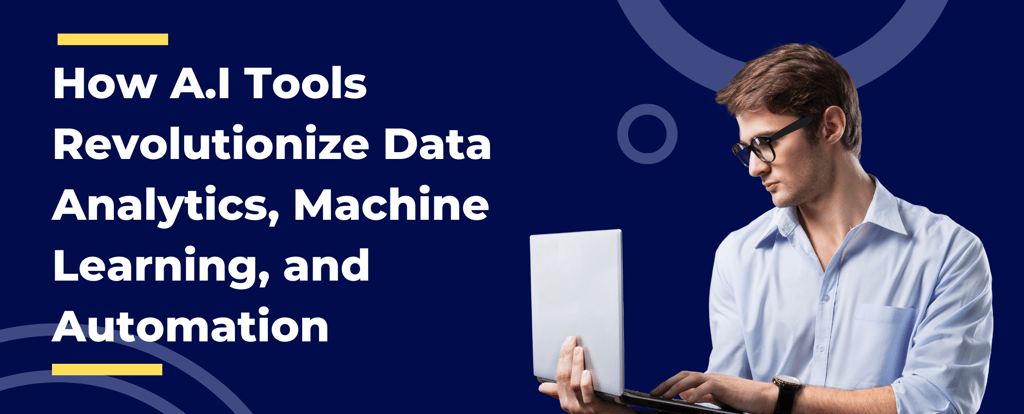The AI Revolution in Wealth Management
Explore the awe-inspiring AI Revolution in Wealth Management as we unveil the financial frontier. Discover how AI reshapes the industry, empowering financial advisors with data-driven insights and personalized solutions. Embark on a journey towards a brighter financial future. #AIinWealthManagement #FinancialFrontier #DataDrivenSolutions #PersonalizedAdvisory #BrighterFuture
AITOOLSPRODUCTIVITY TOOLSBUSINESS GROWTH
New Tools Ai
8/5/20232 min read


Introduction
In the ever-evolving financial industry landscape, Artificial Intelligence (AI) has emerged as a game-changer, transforming how wealth management operates. AI's unprecedented data analysis, pattern recognition, and decision-making capabilities have propelled it to the forefront of modern wealth management practices. In this blog post, we will delve into the rise of AI in the financial sector, its far-reaching impact on the wealth management industry, and how it is shaping the future of financial advisory services.
Embracing AI in Wealth Management
A Paradigm Shift in Financial Advisory
The traditional wealth management landscape primarily relied on human financial advisors to offer clients personalized advice and portfolio management services. However, introducing AI in the industry marked a paradigm shift, augmenting human expertise with machine intelligence. AI-driven algorithms can now analyze vast volumes of financial data in real time, leading to more accurate and data-driven investment decisions.
Enhanced Data Analysis and Risk Management
AI's prowess in data analysis has revolutionized risk management strategies for wealth managers. With sophisticated algorithms, AI can assess market trends, potential risks, and predict market movements more accurately. This advanced risk analysis empowers wealth managers to develop well-informed investment strategies, ensuring better risk-adjusted returns for their clients.
AI-Driven Portfolio Management
Personalization at Scale
One of the most significant advantages of AI in wealth management is its ability to offer personalized investment advice at scale. AI can create tailor-made investment portfolios that align with each client's unique needs and preferences by analyzing individual financial data, risk profiles, and investment goals. This level of personalization fosters stronger client relationships and enhances customer satisfaction.
Real-Time Portfolio Adjustments
In traditional wealth management, portfolio adjustments were often executed periodically. However, AI-powered platforms enable real-time portfolio adjustments based on market fluctuations and changes in clients' financial situations. This dynamic approach ensures that investment portfolios always remain optimized and aligned with the client's goals.
AI and Robo-Advisors
The Rise of Robo-Advisors
Robo-advisors, automated investment platforms that utilize AI algorithms to manage client portfolios, have gained significant popularity in recent years. These platforms offer cost-effective and efficient wealth management solutions, attracting a broader client base, including millennials and tech-savvy investors.
Complementing Human Expertise
While robo-advisors provide a streamlined investment experience, they do not replace human financial advisors entirely. Instead, they complement traditional wealth management services by offering quick and convenient investment solutions. Integrating human expertise with robo-advisors allows wealth managers to focus on providing comprehensive financial planning and holistic advisory services.
The Future of Wealth Management
AI-Powered Financial Insights
As AI continues to evolve, the future of wealth management promises even more sophisticated financial insights and predictive capabilities. Advanced AI algorithms will provide wealth managers with valuable market intelligence, enabling them to make strategic investment decisions with a competitive edge.
Client Engagement and Education
AI's interactive capabilities can facilitate enhanced client engagement and financial education. AI-driven chatbots and virtual assistants can offer real-time responses to client queries and provide educational resources to improve financial literacy among investors.
Conclusion
As AI continues to revolutionize the wealth management industry, its impact is both substantial and far-reaching. Integrating AI-driven technologies in financial advisory services enhances data analysis, risk management, and portfolio optimization, enabling wealth managers to deliver clients personalized and efficient investment solutions. While the rise of AI and robo-advisors may alter the traditional landscape of wealth management, the human touch of financial advisors remains invaluable in building strong client relationships and delivering comprehensive financial planning services. As the industry evolves, embracing AI and human expertise in harmony will undoubtedly shape the future of wealth management, bringing enhanced value and service to clients across the globe.
